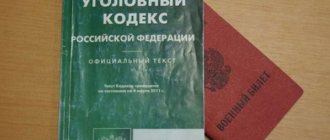ST 331 of the Criminal Code of the Russian Federation.
1. Crimes against military service are recognized as crimes against the established procedure for military service provided for in this chapter, committed by military personnel undergoing military service by conscription or under contract, as well as by citizens in the reserve during their military training.
2. Lost power.
3. Criminal liability for crimes against military service committed in wartime or in a combat situation is determined by the wartime legislation of the Russian Federation.
Commentary to Art. 331 Criminal Code
1. Along with the signs inherent in all crimes, assault in Ch. 33 of the Criminal Code differ in their subject composition: they are committed only by military personnel conducting military service by conscription or under contract, as well as by citizens in the reserve during military training (hereinafter referred to as military personnel, unless otherwise indicated).
The procedure for conscripting citizens into military service and completing it is regulated by Federal Law No. 53-FZ of March 28, 1998 “On Military Duty and Military Service” and the Regulations on the Procedure for Military Service, approved by Decree of the President of the Russian Federation of September 16, 1999 No. 1237 .
The procedure for enrolling citizens in the reserve, the composition of the reserve, as well as issues of military training are established in the Federal Law “On Military Duty and Military Service” and the Regulations on Military Training, approved by Decree of the Government of the Russian Federation of May 29, 2006 N 333.
2. Chapter 33 of the Criminal Code covers crimes committed by military personnel in peacetime. Criminal liability for crimes against military service committed in wartime or in a combat situation is determined by the wartime legislation of the Russian Federation.
NTVP "Kedr - Consultant"
LLC "NTVP "Kedr - Consultant" » Services » Legal consultations » Labor disputes » Is the presence of an expunged criminal record under Art. 318 part 1 of the Criminal Code as an obstacle to engaging in teaching activities in accordance with Art. 331 Labor Code of the Russian Federation
Question.
Is the presence of an expunged criminal record under Art. 318 part 1 of the Criminal Code as an obstacle to engaging in teaching activities in accordance with Art. 331 Labor Code of the Russian Federation
Lawyer's answer.
In accordance with Art. 331 of the Labor Code of the Russian Federation the following persons are not allowed to engage in teaching activities:
deprived of the right to engage in teaching activities in accordance with a court verdict that has entered into legal force;
have or have had a criminal record, have been subject to criminal prosecution (with the exception of persons against whom criminal prosecution has been terminated on rehabilitative grounds) for crimes against life and health, freedom, honor and dignity of the individual (with the exception of illegal hospitalization in a medical organization providing psychiatric care in inpatient settings) conditions, and slander), sexual integrity and sexual freedom of the individual, against family and minors, public health and public morality, the foundations of the constitutional system and state security, peace and security of mankind, as well as against public safety, except for the cases provided for in part three of this articles;
having an unexpunged or outstanding conviction for other intentional grave and especially grave crimes not specified in paragraph three of this part;
recognized as legally incompetent in accordance with the procedure established by federal law;
having diseases included in the list approved by the federal executive body exercising the functions of developing state policy and legal regulation in the field of healthcare.
Persons from those indicated in paragraph three of part two of this article who have had a criminal record for committing crimes of minor gravity and crimes of moderate gravity against life and health, freedom, honor and dignity of the individual (with the exception of illegal hospitalization in a medical organization providing psychiatric care in inpatient conditions, and slander), family and minors, public health and public morality, the foundations of the constitutional order and the security of the state, peace and security of mankind, as well as against public safety, and persons against whom criminal prosecution on charges of committing these crimes was terminated on non-exonerating grounds , may be admitted to teaching activities if there is a decision of the commission on affairs of minors and protection of their rights, created by the highest executive body of state power of a constituent entity of the Russian Federation, on their admission to teaching activities.
Art. 331, “Labor Code of the Russian Federation” dated December 30, 2001 N 197-FZ (as amended on May 1, 2017) {ConsultantPlus}
In accordance with Part 1 of Art. 318 of the Criminal Code of the Russian Federation, the use of violence against a representative of the authorities is classified as a crime against the order of government and in the category of medium gravity.
Based on the above, the expunged conviction under Part 1 of Art. 318 of the Criminal Code is not an obstacle to engaging in teaching activities in accordance with Art. 331 Labor Code of the Russian Federation.
Selection of documents:
Article: If an employee has a criminal record (Kurevina L.V.) (“Human Resources Department of a State (Municipal) Institution”, 2015, No. 5) {ConsultantPlus}
Article: Legal consequences of expunging and expunging a criminal record (Golubev V.V., Kazakova V.A.) (“Russian Investigator”, 2021, N {ConsultantPlus}
{ConsultantPlus}
Article: Restrictions on engaging in teaching activities (Karamurzova Zh.Z.) (“Current problems of Russian law”, 2021, N 1) {ConsultantPlus}
The explanation was given by Igor Borisovich Makshakov, legal consultant of LLC NTVP Kedr-Consultant, June 2017.
When preparing the answer, SPS ConsultantPlus was used.
This clarification is not official and does not entail legal consequences; it is provided in accordance with the Regulations of the CONSULTATION LINE ().
Second commentary to Art. 331 of the Criminal Code of the Russian Federation
1. The concept of a crime against military service is based on the general definition of a crime formulated in Art. 14 of the Criminal Code. Article 331 establishes only the specifics of a military crime.
2. The first feature of a military crime is the specific nature of the object of the attack. The procedure for completing military service is the object of all military crimes.
3. The second feature of a military crime is the presence of a special subject. The subjects of military crimes can be citizens of the Russian Federation and foreign citizens who have the status of military personnel, undergoing military service by conscription or under a contract, as well as citizens in the reserve during military training.
4. According to Part 2 of Art. 12 of the Criminal Code, military personnel of military units stationed outside the Russian Federation are liable under the Criminal Code for crimes committed on the territory of a foreign state, unless otherwise provided by an international treaty of the Russian Federation.
5. To determine the range of subjects of crimes against military service, it is important to establish the initial and final moments of the state in military service.
6. Non-military personnel cannot be perpetrators of military crimes. They can act as organizers, instigators or accomplices, and in this case they will be liable as accomplices to a military crime (see Part 4 of Article 34 of the Criminal Code).
7. Criminal law provisions on liability for military crimes committed in wartime or in a combat situation must be included in the wartime Laws of the Russian Federation.
Article 331 of the Criminal Code of the Russian Federation. The concept of crimes against military service.
Commentary on Article 331
1. The concept contained in the article is part of the general definition of the crime formulated in Art.
14 of the Criminal Code. A military crime is a socially dangerous act committed by a military serviceman, directed against the interests of military service protected by law and prohibited by the Criminal Code under the threat of criminal punishment. A crime against military service has all the signs of a crime in general, each of which has certain specifics that determine the identification of special military crimes in the Criminal Code. Crimes against military service (military crimes) can be divided into two groups:
special military, i.e. those that have no analogues in other provisions of the Criminal Code (for example, desertion);
relatively military, which in some respects are similar to other, ordinary crimes (for example, violent actions against a superior, in their objective characteristics, coincide with some crimes against the person).
2. For the defense of the country using means of armed struggle, in accordance with the National Security Strategy of the Russian Federation until 2021, and the Military Doctrine of the Russian Federation (2000), the Armed Forces were created and military service was established for citizens of the Russian Federation. Defense of the Fatherland is the duty and responsibility of a citizen of the Russian Federation (Part 1 of Article 59 of the Constitution of the Russian Federation).
The main forms of implementation of the constitutional obligation to protect the Fatherland are conscription and military service upon conscription in accordance with the requirements of Federal Law dated March 28, 1998 N 53-FZ “On Military Duty and Military Service,” as well as completion of alternative civil service instead of military service conscription service in the manner established by Federal Law of July 25, 2002 N 113-FZ “On Alternative Civil Service”.
Citizens have the right to fulfill their constitutional duty to defend the Fatherland by voluntarily enlisting in military service. In this case, they perform military service on a voluntary basis (under contract) in accordance with the provisions of the Federal Law “On Military Duty and Military Service” and other regulatory legal acts.
3. The subject of crimes provided for in Ch. 33 of the Criminal Code are military personnel and citizens in reserve during their military training.
Military personnel are citizens of the Russian Federation who perform military service by conscription or voluntarily (under contract). They can also be foreign citizens performing military service under a contract in military positions to be filled by soldiers, sailors, sergeants and foremen.
In accordance with the law, military personnel perform military service in military positions in the following state organizations: Armed Forces of the Russian Federation; internal troops of the Ministry of Internal Affairs of Russia; civil defense troops; engineering and technical military formations and road construction military formations; Russian Foreign Intelligence Service; bodies of the Federal Security Service of the Russian Federation, including the Border Guard Authorities of the FSB of Russia; bodies of the Federal Security Service of the Russian Federation; Service of Special Objects under the President of Russia; military units of the State Fire Service of the Ministry of the Russian Federation for Civil Defense, Emergency Situations and Disaster Relief, as well as special formations created for wartime.
Military personnel undergoing military service under a contract may be sent to non-military positions in international organizations, organizations operating in the interests of defense and state security, or to military departments at federal state educational institutions of higher professional education. For these persons, military service is suspended; they are not included in the Armed Forces or other military formations, and are not considered to be performing military service duties. Therefore, this category of military personnel during the period of suspension of military service is not the subject of crimes against military service.
4. Based on federal legislation, including Part 1 of Art. 331 of the Criminal Code, citizens who are in the reserve during their military training are also recognized as the subject of crimes against military service and, therefore, specific military criminal legal relations.
5. In accordance with Art. 82 of the Geneva Convention relative to the Treatment of Prisoners of War 1949 and Art. 2 of the Federal Law of May 27, 1998 N 76-FZ “On the Status of Military Personnel”, prisoners of war, also recognized as subjects of military relations, may be held criminally liable under certain articles of the Criminal Code on military crimes.
———————————
NW RF. 1998. N 22. Art. 2331.
All of the listed categories of subjects have the legal status of military personnel serving under conscription or contract. On this basis, they are subject to the relevant general and special norms of criminal and penal legislation (Articles 5, 16, 174, Section V of the Penal Code of the Russian Federation).
6. These persons must be legally included in a special system of military-service relations, i.e. possess the characteristics of a special subject. As a general rule, military service can begin no earlier than a person reaches 18 years of age; Conscription for military service is permissible only until the age of 27. For those voluntarily entering military educational institutions, this age may be lower - 16 years.
Special subject characteristics also include the legality of a citizen’s conscription for military service and his suitability for service for health reasons.
For some military crimes, the presence of other signs characterizing their subject is required: the fact of taking a military oath, lawful appointment to the guard or other unit for special service, being in the performance of military service duties, the existence of a relationship of subordination, etc.
Citizens perform military service by conscription, as well as voluntarily (under contract). The conclusion of a contract for military service, its termination, as well as other relations related to it, are regulated by federal law. Thus, a contract for military service cannot be concluded: with citizens against whom a guilty verdict has been passed and who have been sentenced, in respect of whom an inquiry or preliminary investigation is underway or a criminal case against whom has been transferred to court; with citizens who have an unexpunged or outstanding conviction for committing a crime; with citizens serving a sentence of imprisonment.
In accordance with paragraph 3 of Art. 23 of the Federal Law “On Military Duty and Military Service” citizens serving a sentence of compulsory labor, correctional labor, restriction of freedom, arrest or imprisonment are not subject to conscription for military service; having an unexpunged or outstanding conviction for committing a crime; in respect of which an inquiry or preliminary investigation is underway or a criminal case in respect of which has been transferred to court.
In addition, in Art. Art. 23 and 24 of the Federal Law “On Military Duty and Military Service” provide for the grounds upon which citizens are not conscripted for military service.
If it is established that, in accordance with the law, a person was not subject to conscription for military service or was subject to exemption from military duty, conscription for military service, or there were grounds for a deferment from conscription for military service that existed before evading conscription for military service, then in his the act lacks corpus delicti.
In cases where the grounds provided for by law, in the presence of which citizens are not called up for military service, arose during the period of evasion of conscription (for example, in the case of the birth of a citizen’s second child or the admission of a person to a state educational institution of higher professional education and full-time training form), the court releases the person from punishment due to a change in the situation if the conditions provided for in Art. 80.1 of the Criminal Code (clause 3 of the Resolution of the Plenum of the Supreme Court of the Russian Federation dated 04/03/2008 N 3 “On the practice of courts considering criminal cases of evasion of conscription for military service and military or alternative civil service”).
———————————
BVS RF. 2008. N 6 (extract).
7. They are not recognized as military personnel and therefore are not liable under the articles of Chapter. 33 of the Criminal Code, employees of internal affairs bodies and the penal system, students of Suvorov and Nakhimov schools, civilian personnel of military units and institutions, employees of state paramilitary organizations, guard and control units (customs, tax services, private security), members of Cossack societies, etc.
8. The Armed Forces are intended to repel aggression directed against the Russian Federation, armed defense of the integrity and inviolability of the territory of the Russian Federation, as well as to carry out tasks in accordance with the country’s international treaties.
Based on the purpose of military formations, the object presented in Chapter. 33 of the Criminal Code of Crimes is the procedure established in the Armed Forces and other military formations for military service (military law and order), designed to ensure the interests of the military security of the state. At the same time, military security is understood as the state of armed defense of the country and citizens from armed aggression. Any crime against military service, no matter what it is expressed in, one way or another undermines the combat readiness of a military unit, and therefore harms the military security of the country. The public danger of crimes against military service is manifested in causing or creating a threat of harm to the interests of the military security of the state.
Depending on the specification of the sphere of military-service relations, all crimes against military service on the basis of a specific object are united by the Criminal Code into the following groups: crimes against the order of subordination and military statutory relations (Articles 332 - 336); crimes against the rules of military service (Articles 337 - 339); crimes against the procedure for performing special types of military service (Articles 340 - 344); crimes against the order of conservation of military property (Articles 345 - 348); criminal violations of safety rules for the use of military-technical means (Articles 349 - 352).
9. Based on the sign of special illegality, violations of the procedure for serving, not provided for by the norms of Chapter. 33 of the Criminal Code (for example, unauthorized abandonment of a unit or place of service by military personnel serving on conscription, lasting no more than 2 days, and those doing military service under a contract - no more than 10 days).
Other acts committed by military personnel and causing damage to the interests of military service (for example, theft of military property, disclosure of state secrets of a military nature, etc.) are not considered military crimes, but are subject to qualification under other articles of the Criminal Code. All acts falling under the elements of crimes provided for in Ch. 33 of the Criminal Code, and at the same time other criminal law norms, based on competition rules, should be assessed according to the relevant articles of this special chapter, and not according to the general articles of the Criminal Code.
If there are circumstances that go beyond the scope of a military crime and form signs of a more dangerous crime, the act is additionally qualified under an article providing for liability for a specific ordinary crime. So, if a serviceman, resisting his superior, commits his murder, then what he did in terms of intentionally causing death is qualified under paragraph “b” of Part 2 of Art. 105 of the Criminal Code, and resistance - under paragraph “c” of Part 2 of Art. 333 of the Criminal Code (based on the onset of grave consequences of resistance), since murder does not cover resistance, and vice versa.
If the act forms part of a more dangerous crime against a person, then the act is qualified only according to the general criminal norm providing for liability for its commission. Thus, the murder of a superior by a subordinate in connection with his performance of military service duties on objective and subjective grounds is covered by paragraph “b” of Part 2 of Art. 105 of the Criminal Code and additional qualifications under Art. 334 of the Criminal Code does not require it.
Acts that formally contain signs of a particular military offense, but fall under Part 2 of Art., do not constitute a crime. 14 of the Criminal Code and therefore insignificant.
10. Signs of the subjective side of military crimes (guilt, motive, purpose) reflect the military nature (direction) of the crime being committed: the perpetrator in a certain way relates not just to a socially dangerous act and the consequences that have occurred, but specifically to the fact of violation of the normatively defined procedure for military service and to consequences expressed in causing harm to the combat ability of a military unit and the military security of the state.
11. The specificity of the criterion of criminal liability is that correctional labor is not applied to military personnel, and compulsory labor and restriction of freedom are not assigned to subjects serving under conscription (Articles 49, 50, 51 of the Criminal Code). The latter may be subject to detention in a disciplinary military unit, and to persons with a military rank, deprivation of it as an additional punishment (see commentary to Article 48). The entire rest of the system of criminal legal measures (Article 44, Chapter 14, 15, 15.1 of the Criminal Code) is fully applicable to them.
12. The norms of the Criminal Code determine liability only for crimes against military service committed in peacetime conditions. In accordance with Part 3 of Art. 331 responsibility for crimes against military service committed in wartime or in a combat situation should be determined by the wartime legislation of the Russian Federation.
13. According to Part 2 of Art. 12 of the Criminal Code, military personnel of military units of the Russian Federation stationed outside Russia, for crimes committed on the territory of a foreign state, bear criminal liability under the Criminal Code, unless otherwise provided by an international treaty of the Russian Federation.
Responsibility of persons who committed crimes on a warship or military aircraft of the Russian Federation, regardless of their location, occurs under Art. 11 of the Criminal Code.
On notice boards
Bulletin boards are a common occurrence for management organizations. They are located in all entrances of an apartment building managed by the management authority, or within the land plot on which the house stands.
On the notice boards, residents of the building must find the name of the management organization, the license number and its validity period, information about the body that issued the license, the address of the location of the management organization and its representative office, opening hours, days and hours of reception, the address of the management organization’s website, a link to the GIS Housing and Public Utilities website .
Be sure to post the following contact numbers on bulletin boards:
- your organization,
- your representative office,
- emergency dispatch service,
- emergency services of resource supply organizations.
The information listed above is updated within 3 business days from the date of change.
Notices about upcoming work, equipment checks, restoration and other work that may cause inconvenience to residents of the house or for which residents of the house must be present at a certain time must be posted on notice boards no later than 3 working days before the day of the relevant activities.
Notifications about fee changes are also posted here. It must be disclosed no later than 30 calendar days before the date of presentation of receipts to the residents of the house, unless a different period of notification is established by the apartment management agreement.
What information should the management company provide to the owners?
At information stands at the representative office of the UO
The information that is posted on stands or counters in the representative office of the management organization is somewhat different from what is already presented on bulletin boards and signs.
But first it’s all the same standard information:
- name of the MA,
- license number and validity period,
- information about the authority that issued the license,
- address of the location of the MA and its representative office,
- operating mode,
- days and hours of reception,
- UO website address,
- GIS Housing and Communal Services website address,
- contact numbers of the management authority and representative office, ADS and emergency services of the Russian North Ossetia.
In addition to this set, the stands contain step-by-step instructions on the procedure for installing the IPU, the deadlines for paying fees for residential premises or utilities, data on the consequences of late or incomplete payment of such fees, and the deadlines for transmitting the PU readings.
At the stand, oddly enough, there should be information about the GZhN body: functions, name, address and telephone number, full name of the head.
In addition, information is posted on the tariffs used in determining the amount of payment for residential premises or utilities, details of legal acts and decisions of the general public insurance company that establish them.
Standards for the consumption of utility services and standards for the consumption of utility resources are published for the purpose of maintaining OI in MKD, the value of the established social norm for the consumption of electrical energy for groups of households and types of residential premises.
The stand displays a reminder about the rules for the safe use of gas at home, a reminder to consumers of their obligation to enter into an agreement on the maintenance and repair of indoor gas equipment. Another reminder that needs to be posted is about the composition of the monthly payment for residential premises and utility bills with the telephone numbers of responsible persons.
In addition to the above information, information stands should include:
- samples of filling out applications, complaints, appeals;
- proposals of the MA for works and services;
- data on places of waste accumulation, collection of waste of hazard classes I–IV;
- rules for handling waste of hazard classes I–IV;
- procedure for separate waste collection;
- rules for the safe use of mercury-containing lamps and devices.
All information listed above is updated within 3 business days from the date of change.
No later than 30 calendar days before the date of presentation to residents of the house of receipts for residential premises or utilities, notices of changes in the amount of payment for residential premises or utilities are posted on stands.
What information may not be provided to owners







